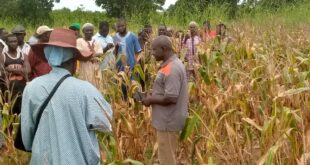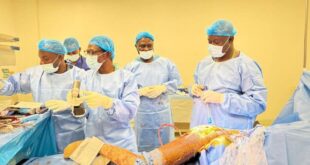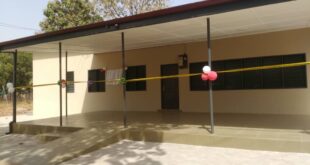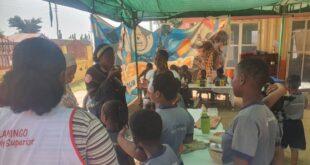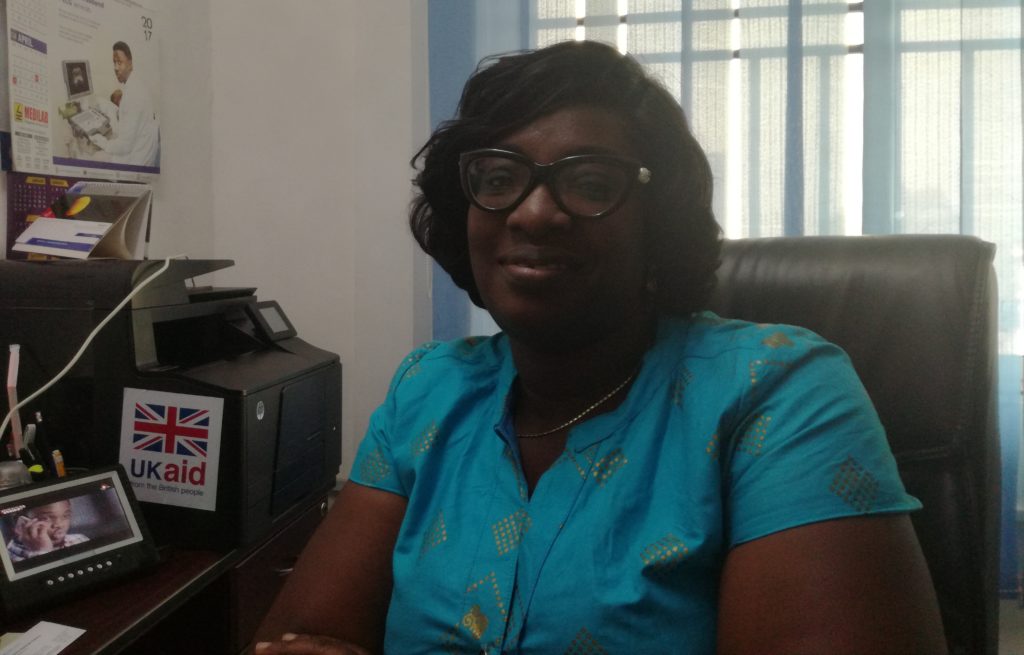
Tamale, Ghana – In the wake of Ghana’s growing population currently estimated at 29.6 million and irresponsible sexual behaviour among the country’s youth coupled with teenage pregnancies and unsafe abortion practices being largely triggered by a lack of sexuality education in school and at home, Editor-in-Chief of Savannah News Joseph Ziem spoke to the Northern Sector Manager of Marie Stopes Ghana, Patricia Antwi-Boasiako. In this interview, much focus has been placed on Northern Ghana where the average woman gives birth to about 6 children yet the use of birth control methods is believed to be the lowest compared to the national average.
Savannah News (SN): Thanks very much madam for this great opportunity. Please, give me a brief background of Marie Stopes Ghana. What do you do? Where do you work in Ghana? And who are your target?
Patricia Antwi-Boasiako (PAB): My name is Patricia Antwi-Boasiako. I’m the Regional Manager for Marie Stopes Ghana, in charge of the Northern Sector. And basically, the Northern Sector comprises of the Northern Region, Upper East and the Upper West Regions, so I work in the three regions. Marie Stopes International is an international organization that believes in sexual reproductive health services. Currently, we are working in 37 countries but we’ve been in existence for 40 years. So it’s a long time globally. When you talk about the Ghanaian context, we’ve been in existence since 2006 and we currently work in the ten regions of Ghana…. We basically look at improving the lives of women across the country by ensuring that they can access family planning and reproductive health services and information they want and need. So generally, what we do as an organization is offer family planning services and safe abortion services. When we talk about family planning we’re really looking at women, we’re looking at girls between the ages of 15-19 and we’re looking at the youth as a whole or women in fertility age. However, we do not leave the men out. The men are also our priority, so we also reach out to men.
SN: There are many misconceptions around the use of contraceptives or family planning methods. How real are these misconceptions?
PAB: Hah. Wow! You know every region has a different context. There are a little bit of differences in socio-cultural backgrounds and for me, in the Northern Region, the little misconceptions I have heard is that, if I take a family planning method I might not be able to give birth again. Err mm if I take a family planning method it might get missing in my system. There are other misconceptions like if I take a family planning method I’ll bleed, I’ll lose so much blood, I’ll become anaemic so because of those misconceptions I am not going to take a family planning method. The honest truth is there is no connection. Everybody has a method that will suit her system and that is why we have centres of excellence; they’re actually clinics that women and men can confidently walk into, talk to us, we will counsel you and we will give you a wide range of modern contraceptive methods that you can choose from, that will be good for your system. So the misconceptions, there are no connections, it’s just a hear say.
SN: How have you been able to navigate around or address these misconceptions?
PAB: Well, so we try to brainstorm to see why these misconceptions, why is it lingering on, what are we not doing right or what are we not doing right as a nation whereby people still have these ideas at the back of their minds, and we realized that there is a lot of lack of accurate information and access to information on sexual reproductive healthcare issues. So basically, we are doing a lot of advocacy at different levels. For our clinic here, we believe that we need to reach out to people to talk about family planning methods, talk about the myths and misconceptions. How do we do it? We go out there to the community, we educate them. We have key stakeholder engagements, so we sort of zoned the people or class of people we talk to.
We do corporate presentations for the formal groups, corporate bodies, banks, etc. we also meet with the informal groups like the tailors, seamstresses, associations of such groups we meet with them, we talk to them and then we dispel the myths.
Fortunately as an organization, we’ve also realized it’s a big problem and so we’ve come out with the satisfied client video. People who have taken the method and how it has helped them; you hear them talk about how it has helped them, how they have been able to manage their business very well by taking the method, how some of them have been able to finish school by taking the method and all the myths and misconceptions they’re talking about is no true. So as an organization, it’s more of an advocacy.
SN: Where do the media come in here? Because you can’t do advocacy without the media.
PAB: Yes, so thank you very much for the question. We’ve had media training in Accra in the Southern sector. There has been media training if I’m not mistaken for about 40 media personnel. We haven’t done for the Northern sector because it’s much more being piloted in the Southern sector particularly in Accra. But there is been media training for all the media that we wanted involve in this campaign.
SN: How has Marie Stopes been able to increase or expand access to and use of contraceptives/family planning services in Northern Ghana?
PAB: Alright! So, as I said, err mm access has also been a problem, that’s what we’ve also realized. As an organization we’re also asking ourselves, or as a country or nationally, do we have the right number of facilities to provide the services? That is one. We’re also asking ourselves if we don’t have the right number of service or even if we have, the service providers, do we have the right capacity to provide the services? Currently, Ghana Health Service is leading in providing family planning services. And we felt that partnering with them will be very realistic and that’s one reason why as an organization we have clinic in all the regions. And our clinics are such that, they’re very youth friendly because we’ve realized that young boys and girls are very sexually active and at times they find it difficult going to queue in Ghana Health Service facilities. Then we’re saying that you could come to us, talk to us in privacy and you will be assured that whatever information you share with us is very confidential. You can have access to information and we also give you access to the services.
We also work with the Ghana Health Service in another way that is known as the public sector strengthening. Though service providers have the capacity to provide long term methods, do they know how to provide or fix an IUD or fix an implant? In that way, Marie Stopes Ghana has helped built hundreds of service providers in providing these services. Talk about Upper East Region, we have trained midwives well over 300; Upper West Region we have trained midwives and nurses and the same applies to the Northern Region. So that is how Marie Stopes Ghana is helping.
We also have a business channel. We’ve realized that despite these facilities, some other people will feel comfortable talking one-on-one. So we have a business channel we call the Marie Stopes Ladies. And these ladies are actually trained health professionals either midwives or community health nurses and they provide services at the doorsteps of the client; either the client home or Marie Stopes Ladies home, wherever the client feels comfortable.
SN: Talking about the youth, I will like to find out from you what is the rate of teenage pregnancy currently especially in the Northern part of the country?
PAB: Ooh hmmm. I really would have loved to get you some figures but I always say that Ghana Health Service is on top of these figures. But I can just give a little bit of breakdown from the demographic health survey that was carried out in 2014. So when you look at teenage pregnancy, for the Northern Region 7.9 percent, Upper West Region 9.2 and Upper East Region 8.0 percent. Half year 2017, 57,000 girls were pregnant nationwide. So the truth is, teenage pregnancy is very real. And the interesting thing is, though these figures might be low nationally, if you go at the regional level they are very high. So let’s say for the Northern Region, adolescent pregnancy rates are very high in Bole, North Gonja and Sawla-Tuna-Kalba with about 17.5, 16.1 and 17.7 percent respectively. So it’s an issue, it’s a real big problem.
SN: So what are we missing? Is it that the education is not going down well or there is some misinformation out there that the youth are picking up and acting on it?
I think that it’s all about information. The first thing I will say is that, the youth of today are exposed a lot; a lot of information is being given out….We as an organization are looking at giving them accurate information. The problem is the youth find it difficult to access sexual reproductive health services. Just to walk into a facility and say look, I have some body changes, I feel like having sex. This is impossible for many youth to do due to the unfriendly nature of our public health facilities. If we’re able to have facilities that are youth friendly, that accept that these are changes happening in these boys and girls and those are somethings that if you are not able to talk to them, they might want to go out there and taste it. So we need to be youth friendly….as a nation we need to look at that gap, help these young children or the youth to create a very friendly and enabling environment for them to come out and talk to service providers so that we can guide them on what to do. You might want to abstain, if you can’t you will be taught how to do it. If you are still sexually active and cannot accept it, we have contraceptive methods, take them, protect yourself rather than getting pregnant. Trust me, if they get pregnant, they will have an abortion. No matter what you do, they will go anywhere to have an unsafe abortion.
SN: To what extent will you say that the lack of sexuality education at homes and schools has contributed to the increasing rates of teenage pregnancy and unsafe abortion practices in the country?
PAB: Evidence in the literature shows that inadequate sexuality education is a major precursor to risky sexual behaviour among adolescents. Because young people are not adequately informed, their sexual behavioural choices are often predicated on assumptions, misinformation and scanty information they may have chanced upon somewhere. For the adolescent, the home and the school system are where they spend most of their productive hours in the day (8-10hrs in school, 4-6hrs at home, 8hrs in bed). This implies therefore that the greatest opportunities to educate them on sexual and reproductive health issues are in these two locations. Any missed hour with them in these two locations therefore make them most vulnerable to making wrong choices, on the basis of the little information they may have come across on their own. Failure therefore, on the part of the home and the school to provide some level of sexuality education to the adolescent can be said to be partly responsible for the observed rise in teenage pregnancies and unsafe abortions.
SN: There’s also a growing rate of abuse of emergency contraceptive pills among young unmarried girls particularly those in the basic and senior high schools. Are there any consequences for their behaviour?
PAB: Science has as yet, not been able to establish the full potential risks of abusing emergency pills. Studies are still ongoing. This makes it even more disturbing to abuse such drugs, because we are not certain what the long term implication of that could be. There are suggestions that abuses can delay fertility, but that has not been proven scientifically. It is undeniable, however, that the abuse of any drug at all puts a lot of pressure on the liver and the kidneys, and can cause kidney failures and liver related problems. These two are established risks of drug abuse. Hopefully, studies ongoing can provide further information on the other risks of abuse of emergency contraceptives in the coming years.
SN: There are suggestions that Ghana should limit the number of children a couple can have to three. Does Marie Stopes think that is the way to go in order to control the country’s population growth?
PAB: Very interesting question especially looking at where I’m sitting; looking at the Northern sector the way we pride ourselves in having a lot of children. In the North, if you have a lot of children, you’re very much respected, so I really respect that. But let’s look at the realities. There are some policies that have come into place. There is a national policy in 1969, that is what you just mentioned; that we should limit our children to three. Why were these things coming on? Because we realized that the population is increasing by the day. There’s been a population growth, it’s like a boom. At the last survey, we were about 24.6 million Ghanaians; same population, same size, infrastructure, the same thing. Currently as we’re talking, we’re almost 29.6 million Ghanaians with a total fertility rate of 4.2. So it means, one person should give birth to about four or five children. The population growth is so great; every year, we’re adding on more than 800,000 people to the population of Ghana. The question is, will the nation be able to contain it? We’re not changing any infrastructure. The infrastructure is the same, the schools are the same, the universities are the same. We’re taking and enrolling the same numbers. Are we able to cater for that? So as an organization, we believe that controlling birth rate will be good, limiting the number of children you have will be good and spacing your birth will also be very good as a nation. And I believe we’re complementing the Ghana Health Service in that regard.
SN: Should couples be given incentives as a way of encouraging them to subscribe to family planning services?
PAB: Huh. The woman is pregnant. The woman is having six or eight children. Would you want to take very good care of your children or would you just want to leave your children to have any type of education or no education at all? I think male involvement is key; we need to involve the males in the agenda we are trying to drive, about sexual reproductive healthcare. As an organization, we do not believe in giving incentives. But we believe that we should be talking more to the males for there to be male involvement. Recently it’s been good. We see one or two men coming with their wives or their partners to talk about family planning, which has improved. But incentivize, not really hahaha (laughter).
SN: Incentivizing couples wouldn’t work?
PAB: Err mm, I don’t think it would work. I mean, looking at our strong socio-cultural background it wouldn’t work. Like I said before, children are the pride of this region, so why should anyone incentivize couples so that they don’t have any more children. So I don’t think it would work. I think educating them will be good. If you want to have six children and you can afford, it’s great but space your birth so that the children can grow nicely.
SN: Talking about spacing, how many years interval would you recommend a couple choose?
PAB: Aah!! Ok I’m not a clinical person. But the little that I know, I believe that if you’re able to give yourself two to three years it is good. The reason being that, it makes the woman very strong; because after delivery, we (women) lose a lot of energy. So if the woman becomes strong, she will be able to take care of another baby. And it’s also good the baby is weaned off before another baby comes in; because if you have a child that is may be six months and you get pregnant again, automatically you will have to wean off the child. The baby cannot breastfeed again. So as health professionals, we’re saying that, try and breastfeed up to one and half years before there is another pregnancy.
SN: What is the most outstanding success story of Marie Stopes in Northern Ghana?
PAB: Well, it’s been a long journey. Like I said before, we’ve been in existence since 2006. In the Northern Sector, we’ve been here since 2012. We have various channels that we reach out to people and in 2012 we had only one channel, and that was the clinic. Currently, we are implementing so many projects; we’re partnering with Ghana Health Service and we have reached thousands of women. For instance in Tamale in 2015, 2,807 walked into our centre either to access services or sexual reproductive healthcare information from us. In 2016, we had 3,552 and 2017 we had 3,563 clients walking through our centres. Then we added the other channels including Blue Star Network, a private sector operator. In 2017, we had 6,473 clients walking into their facilities to access family planning services and information. For the Marie Stopes Ladies which is quite new (started in 2017), we had 3,557 clients attended to by these wonderful ladies. We also build capacity of service providers particularly Ghana Health Service. For those facilities, we had 6, 022 clients accessing services for free. This is because we had to bridge the gap (financial barriers) by going to hard to reach communities and provide services for free. So in total, for the Northern Sector in 2017 we reached 19,616 clients and I believe this is a huge success story for us. And out of these clients, we had women, we had girls and we had men accessing family planning services, accessing safe abortion services and sexual reproductive health information. So yes, this has been very good for us as an organization.
SN: What does the future looks like?
PAB: very bright, very, very bright. And I say it is bright because, looking at the numbers for 2012 and 2018, and I can see that a lot of information has gone out and a lot is yet to be done. Currently, having realized there is a gab in terms of access to quality information, we have launched a campaign. It’s called the “Time to Talk” campaign. Basically, we want women and girls to get access to accurate and reliable information about family planning methods and sexual reproductive healthcare services. So we have numbers you could call in to talk about your SRH problem. We have a toll free number 0800208585. And the good news is, there’s a whatsApp number 0556489090. You could call in, you could whatsApp us and we have trained people who are ready to answer your questions. It’s a national thing, so definitely it goes to a call centre in Accra. But as I said before, we work in the ten regions of Ghana, so whoever you talk to, the person will direct you to a facility to enable you talk to a healthcare provider.
SN: Thank you very much madam, it’s been nice talking to you.
PAB: You’re welcome.
By Savannahnewsonline.com
 Savannah News Online Reporting Only What Matters Most
Savannah News Online Reporting Only What Matters Most
